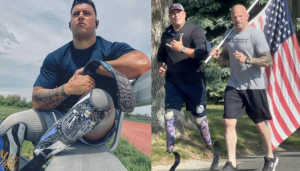
A Marine veteran’s removal from an exit row seat due to his prosthetic legs raises serious questions about disability rights and airline policies.
Story Overview
- Matias Ferreira, a Marine veteran and double amputee, is suing Delta Air Lines for discrimination.
- Delta cited FAA regulations to justify removing Ferreira from the exit row.
- The incident highlights inconsistencies in airline policies concerning disabled passengers.
- Advocacy groups are calling for clearer, more inclusive policies.
Delta’s Decision Sparks Outrage
In 2024, Matias Ferreira, a Marine Corps veteran who lost both legs in Afghanistan, faced unexpected treatment on a Delta Air Lines flight. Despite his physical fitness and capability, Delta staff removed him from an exit row seat citing FAA regulations.
This move, Ferreira argues, discriminates against his ability, sparking a lawsuit and widespread public outcry. Delta’s interpretation of the rules, which require exit row occupants to be “willing and able” to assist in emergencies, is under scrutiny for potentially violating disability rights.
This incident has drawn significant media attention, not only for the alleged discrimination but also for its broader implications on how airlines interpret FAA regulations. The lawsuit, filed by Ferreira, seeks to challenge the subjective application of the term “able-bodied” and demands accountability and change in Delta’s policy.

Advocacy for Veterans and Disabled Passengers
The incident with Ferreira is not an isolated case. Similar experiences by veterans and disabled passengers have previously led to public debates and legal challenges. The Air Carrier Access Act (ACAA) mandates accommodations for disabled passengers, yet the application of these rules often varies.
Advocacy groups have leveraged Ferreira’s case to push for more definitive guidelines that prevent discrimination while ensuring safety. They argue that visible disabilities should not automatically preclude individuals from sitting in exit rows if they are otherwise capable and willing to assist in emergencies.
Ferreira’s professional background as a police officer further emphasizes his capability, challenging the rationale behind Delta’s decision. Advocacy groups are using his story to highlight the need for policy reforms and sensitivity training among airline staff.
Potential Industry-Wide Changes
As the lawsuit progresses, it has the potential to set a precedent for how airlines across the industry handle passengers with disabilities. The case has underscored the necessity for clearer, consistent policies that align with the principles of the ACAA. This could result in airlines revising their training programs and emergency protocols, ultimately fostering a more inclusive environment for all passengers.
The scrutiny Delta faces is expected to pressure other airlines to proactively examine their policies to avoid similar legal challenges and public relations setbacks. This case may lead to significant policy changes not just at Delta, but industry-wide, ensuring better compliance with disability rights and safety regulations.
Sources:
Law Enforcement Today (detailed incident report and background)



